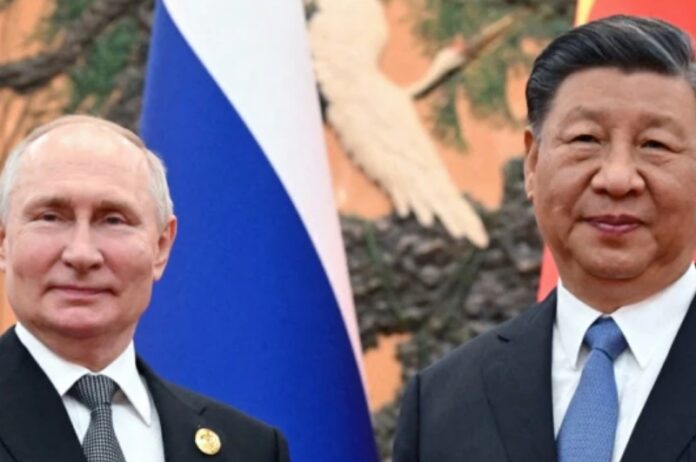The jubilee forum "One Belt, One Road" dedicated to the tenth anniversary of the existence of this global Chinese infrastructure project has ended in Beijing. It was attended by delegates from 130 countries, including the Russian Federation. The quintessence of the negotiations between the Chinese and Russian leaders was the statement of strengthening the coordination of the efforts of China and Russia on all key international platforms. But the main consequence of this cooperation is the critical dependence of the Russian economy on the Chinese economy. It is also important for Ukraine because, under such conditions, China is unlikely to allow a complete military defeat of the Russian Federation.
Ten years ago, China launched the "Belt and Road" - a global project that became the basis of Xi Jinping's grand strategy and remains so today.
But the world has changed significantly in ten years. The share of China's economy in the world increased from 13 to 19 percent. China has fulfilled Nikita Khrushchev's long-standing dream of catching up and overtaking America, but so far by GDP calculated on the basis of purchasing power parity. China's supply chains, investments and infrastructure projects have expanded significantly, increasing its influence in global affairs and challenging the long-held hegemony of the West. The "Belt and Road" has become the most important tool for Beijing's global influence.
However, not everything is so carefree in the Celestial Empire. China's economy is showing symptoms of crisis and requires greater success from the "Belt and Road" to preserve the country's sustainable economic development and strengthen its global position. In the struggle for a new world order, China needs allies. Representatives of 130 countries participated in the summit, but is this enough? The number is impressive, covering more than half of the countries in the world, but for Beijing in this case, the main role is not played by the number. The long-term strategy was to tap into Europe's huge market, open it up to Chinese goods and make trade a driver of relations with the EU. In the long run, this could weaken transatlantic ties and make it easier for China to struggle for leadership with the United States.
But there were few Europeans at the summit. The Russo-Ukrainian war, started by one of China's main partners, Vladimir Putin, has hit China's European policy, significantly worsening its perception in Europe and drawing a political bill for its economic rapprochement with Beijing. The 130 countries whose representatives appeared in Beijing these days are already open to Chinese influence, and some of them - Russia in the first place - have recently begun to feel this influence much more strongly. But China was interested in Europe - and it is here that the problems of the "Belt and Road" are the most tangible, and the prospects are the foggiest. Italy promises to withdraw from the megaproject; the 16+1 initiative is crumbling; future relations with key European economies, primarily Germany, are uncertain. The pandemic has almost halved China's total investment in the economies of the Belt and Road countries, and many of these countries are showing dissatisfaction with the amount of investment, its terms and access to the Chinese market. Of about a trillion dollars of investments over ten years, a significant part of them did not bring results and did not justify the hopes of poor countries for economic prosperity.
The political horizon is not cloudless either. China has become the main threat to US security. Washington's vigorous steps in the international arena are directed against him. This significantly harms China's interests and prospects, drawing it into trade wars at an inconvenient time and creating security risks. The pace of political events has accelerated significantly over the past two years and has become faster than Beijing had anticipated. The "Belt and Road" should become a tool for the slow but steady growth of China's global influence and the transformation of its economy from a simply large one to a large and developed one. However, numerous crises, the largest of which was the Russian invasion of Ukraine, completely changed the situation and raised the stakes.
Beijing was looking for answers this week. Countering the West remains the basis of global strategy; "Belt and Road" is complemented by a number of other ideas - primarily initiatives on global security, development and civilizations; and the place of Beijing's key strategic partner was taken by Russia. China continues to consolidate around itself the Global South.
Xi Jinping's talks with Vladimir Putin, of course, drew a lot of attention from the Ukrainian audience. The quintessence of these negotiations was the statement of strengthening the coordination of the efforts of China and Russia on all key international platforms. The growth of trade between these countries by 50% in the first half of 2023 and the geography of Russian energy exports can be quite convincing illustrations of Moscow's critical dependence on Beijing. Both countries are interested in broad cooperation, and for Ukraine this means that China is unlikely to allow Russia to lose the war under such conditions.
China will continue to fight for a change in the international order. It will rely on allies among developing countries. On his side will be Russia - the only one of the great powers (in terms of its size - "Apostrophe"), and therefore a special partnership without borders between Moscow and Beijing will remain a priority for China. You should not wait for Chinese pressure on Russia; but there will be no open support for it in the war against Ukraine either - at least until the conditions for Moscow become critical.


